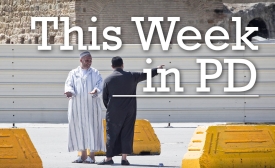digital diplomacy

Headlines on how PD might help bridge the divide between Israelis and Palestinians.
Facebook has announced a new system for alerting users when their accounts have been compromised by “state-sponsored actors,” the latest measure taken by the social network to convince users that it is a partner against unlawful government surveillance and espionage.
The camera rolls from left to right on a dolly as the actors, all African, go through their lines, a sound operator holding a boom steady over their heads under bright studio lights. It could be a scene from any film set but Kunle Afolayan hopes "The CEO" could drive change in Nigeria's hugely popular and prolific movie industry, Nollywood. "'CEO' represents Africa as a continent," said the filmmaker.
Karla Cabrera [...] was excited when she came across "Introduction to Mao Zedong Thought," an online course about the Chinese revolutionary leader. But when Cabrera began watching the lectures on a popular online education platform owned and administered by Harvard and MIT [...] each class opened with a patriotic video montage. Talk of Mao's errors was minimal, restricted to the Communist Party line.
But digital diplomacy is not the same as digital outreach, and it is not limited to Facebook. My focus in this debate has been on the need for DFAT to develop and exploit online influence, not to critique its online reach. I agree with DFAT's own definition that diplomacy is less about popularity and more about persuasion. Australia's ability to use digital tools to persuade or influence populations was not assessed in the Portland report.
The past two weeks have seen the onset of a new cycle of violence between Israel and Palestine. To date, this cycle has claimed the lives of tens of Palestinians and Israelis. As the violence wages on, both Israel and Palestine have turned to social media in order to offer their interpretation of events. From a research perspective, this use of social media offers a glimpse into how nations use digital diplomacy in times of crisis.
The Asia Pacific is the most dynamic digital landscape in the world, home to the fastest adopters of new technologies and the largest concentration of mobile and social media users. An escalation in online activism, changing cyber dynamics, developments in digital diplomacy and the exploitation of big data are shaping the region's engagement with the world.
Homeland […] has been subject to much criticism for its depictions of its Arab and Muslim characters. When, last summer, a group of Arab artists in Berlin were contacted by Homeland set designers to help make one of their sets […] look more authentic with Arabic anti-regime graffiti, they agree—but they splayed the walls with anti-Homeland graffiti instead, attempting, they said to “subvert” the show’s message.







